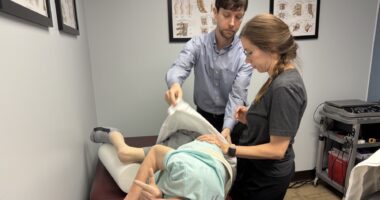On My Latest Escape From the Grave: My Recent Hospitalization


I was going to have a cardiac arrest. That’s what a doctor told my mum during my latest hospitalization for an infection, preparing her for the worst. My acid levels were too high, confirmed by a blood test and my struggle breathing. In his decade of experience, the doctor said, he’d never seen someone recover from acid levels as high as mine. He gave me three days to live at most.
I didn’t know about this exchange until I was better. Mum told my caregivers and family members not to tell me. She was afraid I’d give up fighting for my life if I knew.
As the days passed, relatives trickled into the ward with the autumn rain to visit, but I assumed they just wanted to see how I was doing; it’s how my family works. Once one member of the clan is down, everyone gets wind of it and shows up for you. Especially if you have SMA and they know the slightest problem can herald your demise.
I was hospitalized Sept. 9. Clearly, I lived past the three-day estimate and turned out fine.
That’s not to say it was easy and it wasn’t a fight to keep me alive, from the ambulance ride to the second I arrived home. Costly as it was to my body, I got to see some of the cracks in Singapore’s healthcare system with this hospitalization. Healthcare policy was essentially the reason why I was put in situations that caused distress and exacerbated my condition.
Paramedic policy dictated I be sent to the nearest hospital, instead of the hospital where my records were and where I assumed I’d be better taken care of. Never mind that I had difficulty breathing, my BiPAP needed charging, and I hadn’t eaten much that day. I had to be shipped from the first hospital’s emergency room to the emergency room of the hospital with my records.
Emergency room policy at that hospital, which I thought would understand my disability, locked my mum and caregiver out. They weren’t allowed to assist me in the room. It wasn’t something I minded for a few minutes, but the hospital was overflowing with patients. I couldn’t get a bed in the high dependency ward for hours. I wasn’t even informed; I had to overhear medical staff to know about the situation.
Once I knew, I screamed for help despite the strain on my lungs and my BiPAP mask coming loose. If I had to wait for hours, I needed someone I trusted to handle regularly repositioning my body, as I have chronic neuropathy and am easily injured. No one attended to me for a long time, even if they were close, until a doctor with graying hair saw my distress and let my caregiver in.
The policy of the high dependency ward didn’t allow my mum and caregiver to stay overnight. Thankfully, Mum argued with medical staff for that accommodation. I’m glad she did because the first night was the night my acid levels jumped and my mum was told to prepare to say goodbye to me.
I didn’t have a drip going because doctors didn’t know that the standard insertion of an arterial line in my arm would severely damage the one hand with veins that the doctors could use. Needle pricks covered my limbs as evidence of failed intravenous line insertions. My breathing was so laborious, my BiPAP settings went up by eight points. Nurses had to feed me cups of sugar and water because my sugar levels were worryingly low. Mum, my caregiver, and I barely slept.
Policy, policy, policy. I hate that word now.
I understand why certain policies were implemented, but adhering to policy and standard protocol over respecting my unique needs as an SMA patient endangers my life. I dread to think what would’ve happened if my mum hadn’t stayed that first night. It was her fierce advocacy for me come morning that got me the care I needed from a consultant, who suggested a peripherally inserted central catheter over fruitlessly searching for a vein for another intravenous line.
With some distance now, I can say I’m not mad at the hospital’s staff. They did their jobs the best way they knew how. But I am mad at the ableism enshrined in the rigidity of Singapore’s current healthcare policies in hospitals.
The news coverage on education and the workforce for people with disabilities in Singapore is exciting, but until light is shed on the damage our present healthcare policies can do, future plans for reformed policies, and the need for better training regarding care for rare disease patients, Singapore can’t take some of the most important steps toward becoming an inclusive society. No one should have to feel as dehumanized as I did.
Note: SMA News Today is strictly a news and information website about the disease. It does not provide medical advice, diagnosis, or treatment. This content is not intended to be a substitute for professional medical advice, diagnosis, or treatment. Always seek the advice of your physician or other qualified health provider with any questions you may have regarding a medical condition. Never disregard professional medical advice or delay in seeking it because of something you have read on this website. The opinions expressed in this column are not those of SMA News Today or its parent company, BioNews, and are intended to spark discussion about issues pertaining to spinal muscular atrophy.
The post On My Latest Escape From the Grave: My Recent Hospitalization appeared first on SMA News Today.


